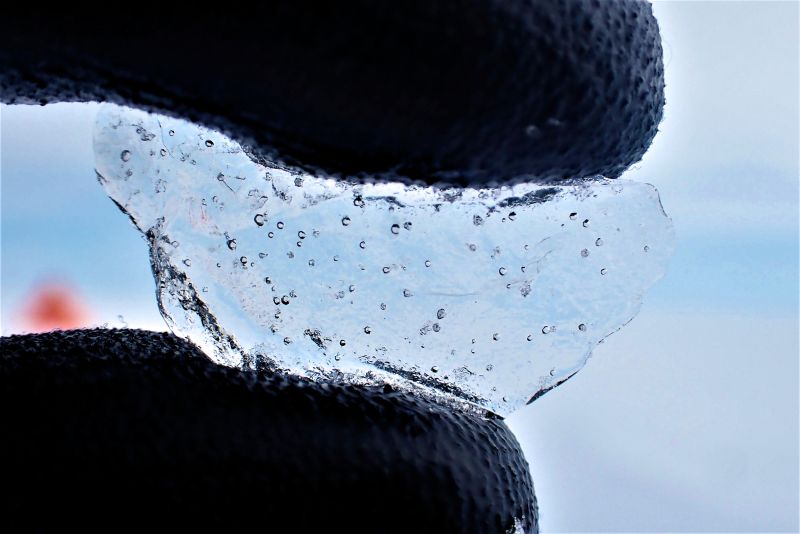Evidence from a 2,000-foot-long ice core reveals that the West Antarctic Ice Sheet shrank suddenly and dramatically around 8,000 years ago, according to new research — providing an alarming insight into how quickly Antarctic ice could melt and send sea levels soaring.
Part of the ice sheet thinned by 450 meters (1,476 feet) — a height greater than the Empire State Building — over a period of just 200 years at the end of the last Ice Age, according to the study published Wednesday in the journal Nature Geoscience.
It’s the first direct evidence that shows such a rapid loss of ice anywhere in Antarctica, according to the study’s authors.
While scientists knew the ice sheet was bigger at the end of the last Ice Age than today, much less was known about when exactly that shrinking happened, said Eric Wolff, a glaciologist at the University of Cambridge in the UK and a study author.
Now it’s clear the ice sheet retreated and thinned very rapidly in the past, Wolff said, the danger is that it could begin again. “If it does start to retreat, it really will do it very fast,” he added.
That could have catastrophic consequences for global sea level rise. The West Antarctic Ice Sheet holds enough water to raise sea levels by about 5 meters – more than 16 feet — which would cause devastating flooding in coastal towns and cities around the world.
The study is “an excellent piece of detective work” about a major part of the Antarctic ice sheet, said Ted Scambos, a glaciologist at the University of Colorado Boulder.
Ice cores are historical archives of the Earth’s atmosphere. Made up of layers of ice that formed as snow fell and compacted over thousands of years, they contain bubbles of ancient air as well as contaminants that provide a record of environmental changes over millennia.
The ice core analyzed in the study was drilled from Skytrain Ice Rise located at the edge of the ice sheet, near the point where the ice starts to float and become part of the Ronne Ice Shelf.
Scientists extracted it in 2019, in a painstaking process that involved drilling constantly for 40 days, pulling up a thin cylinder of ice a few feet at a time. They then cut the core into sections, packed them in insulated boxes kept at minus 20 degrees Celsius, and sent them to the UK via plane then ship.
Once in the UK, the scientists measured the ice core’s water isotopes, which provide information on temperature in the past. Warmer temperatures indicate lower-lying ice — think of it like a mountain, Wolff said, the higher up you go the colder it gets.
They also measured the pressure of trapped air bubbles in the ice. Lower-lying and thinner ice contains higher pressure air bubbles.
It was a surprise when the data revealed just how quickly the ice had thinned at the end of the last Ice Age, Wolff said. “We actually spent a lot of time checking that we hadn’t made a mistake with the analysis.”
The West Antarctic Ice Sheet is particularly vulnerable to climate change, because the land under it is below sea level and slopes downward. When warm water gets underneath, it can melt very fast. “It can have a runaway process, and that’s evidently what happened 8,000 years ago,” Wolff said.
The crucial thing “is not to test it too far,” Wolff said, and that means tackling climate change. “We can avoid these tipping points still,” he said.
The new data will help improve the accuracy of the models scientists use to predict how the ice sheet will respond to future global heating, the report says.
David Thornalley, an ocean and climate scientist at University College London, said the study’s data was “striking.” He cautioned that as the study looked at a period 8,000 years ago, when climate conditions were different, the results aren’t a direct example of what could happen today. But, he added, they are still able to offer an “insight into the way that ice sheets can collapse.”
The study comes as scientists continue to sound the alarm about what is happening to the Earth’s most isolated continent.
For example, the Thwaites Glacier, also in West Antarctica, is melting rapidly. A 2022 study said the Thwaites — dubbed the Doomsday Glacier for the catastrophic impact its collapse would have on sea level rise — was hanging on “by its fingernails” as the planet warms.
This new study adds to these concerns, Scambos said. “(It) shows that the very same processes we are seeing, just beginning now in areas like Thwaites Glacier, have played out before in similar areas of Antarctica and indeed, the pace of ice loss was equal to our worst fears about a runaway ice loss.”

